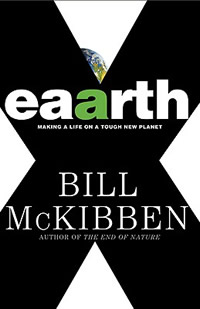Book Notes
 Bill McKibben, Eaarth; Making a Life on a Tough New Planet (New York: Times Books, 2010), 253pp.
Bill McKibben, Eaarth; Making a Life on a Tough New Planet (New York: Times Books, 2010), 253pp.
For about ten thousand years human civilization has enjoyed planet earth with its remarkable Goldilocks nature — not too cold, not too hot, but just right for plants, animals, and humanity itself to flourish. But the best scientific data on climate change and global warming now conclusively show that in the last two hundred years we have permanently altered this sweet spot, and it's never to return. We now live on a different planet, says Bill McKibben, and to force ourselves to face this new reality he suggests a new name: eaarth.
Since his publication of The End of Nature (1989), the first book about climate change written for a general audience, McKibben has built a reputation as "probably the nation's leading environmentalist" (Boston Globe) and "the world's best green journalist" (Time). This elegy for earth might also establish his reputation as the most ruthlessly realistic (or pessimistic) environmentalist. In hundreds of stories and statistics about rising sea temperatures and acidity, expanding tropics, bark beetles that have destroyed millions of acres of forests in the Rockies, Arctic ice melting at record speed, and peak oil, he shows how permanent environmental disaster is not some speculation about a future "threat" that we might pass on to our grandchildren, but an irreversible catastrophe that happened not long ago with our parents. And as is so often the case, the poor of the world, who have contributed the least to these problems, bear the brunt force of their consequences. The earth as we once knew it is gone forever.
Whereas standard wisdom once indicated that we might safely get by with a maximum of 550 parts per million of carbon dioxide in the atmosphere, scientists have now concluded that the maximum is about 350 ppm. We're already at 390 ppm, and at least one British study indicates that it is "improbable" that we will be able to stop short of 650 ppm, even if we adopt "draconian measures." At best, "we're like the guy who smoked for forty years and then he had a stroke. He doesn't smoke anymore, but the left side of his body doesn't work either." And some of the worst advice we're getting comes from so-called "green growth" people like Thomas Friedman who think we can grow our way out of this disaster in some "clean" manner.
McKibben's prognosis is so pessimistic that in his introduction he fears that it might give some readers "an excuse to give up." Nevertheless, in the second half of his book he argues that we can "build durable and even relatively graceful ways to inhabit this new planet," and "manage our descent and aim for a relatively graceful decline" (84, 99). In matters of food and energy, we need to think about "local and dispersed" resources rather than centralized ones that are too big to fail. We need to reorient ourselves toward maintaining what's left and getting smaller, rather than endless expansion and growth. We need to cut our fossil fuel use by a factor of twenty. But whether such personal and local actions can mitigate systemic and global problems was the question that haunted me at the end of this book. I kept thinking of Cormac McCarthy's The Road.


